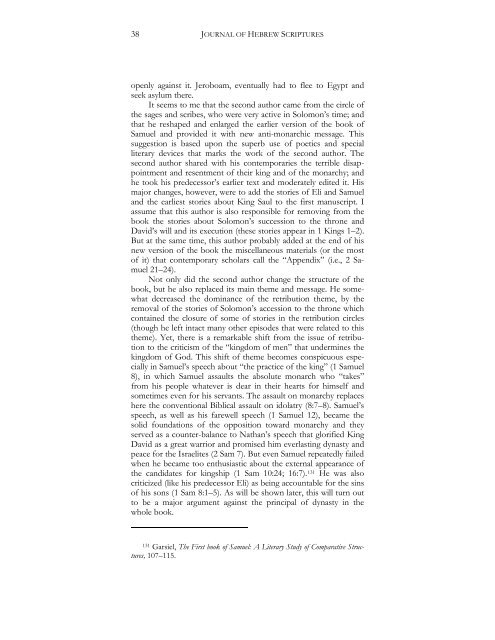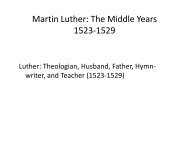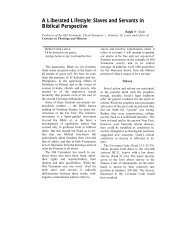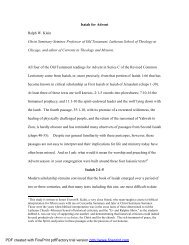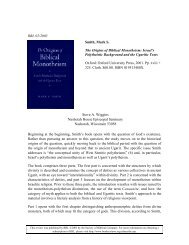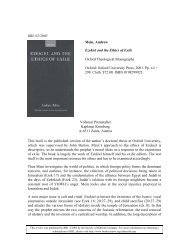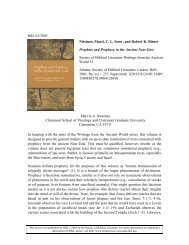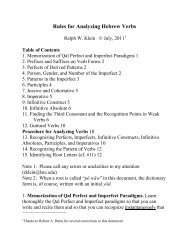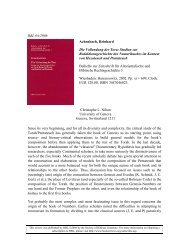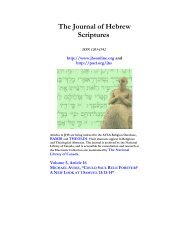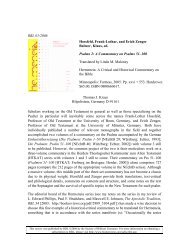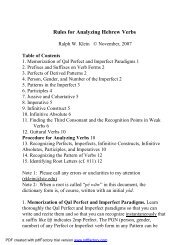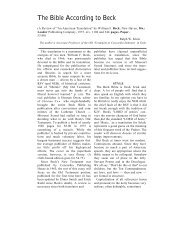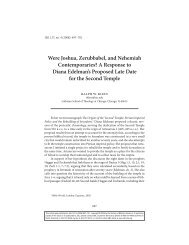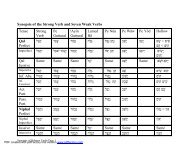The Book of Samuel: Its Composition, Structure and Significance as ...
The Book of Samuel: Its Composition, Structure and Significance as ...
The Book of Samuel: Its Composition, Structure and Significance as ...
You also want an ePaper? Increase the reach of your titles
YUMPU automatically turns print PDFs into web optimized ePapers that Google loves.
38 JOURNAL OF HEBREW SCRIPTURES<br />
openly against it. Jeroboam, eventually had to flee to Egypt <strong>and</strong><br />
seek <strong>as</strong>ylum there.<br />
It seems to me that the second author came from the circle <strong>of</strong><br />
the sages <strong>and</strong> scribes, who were very active in Solomon’s time; <strong>and</strong><br />
that he reshaped <strong>and</strong> enlarged the earlier version <strong>of</strong> the book <strong>of</strong><br />
<strong>Samuel</strong> <strong>and</strong> provided it with new anti-monarchic message. This<br />
suggestion is b<strong>as</strong>ed upon the superb use <strong>of</strong> poetics <strong>and</strong> special<br />
literary devices that marks the work <strong>of</strong> the second author. <strong>The</strong><br />
second author shared with his contemporaries the terrible disappointment<br />
<strong>and</strong> resentment <strong>of</strong> their king <strong>and</strong> <strong>of</strong> the monarchy; <strong>and</strong><br />
he took his predecessor’s earlier text <strong>and</strong> moderately edited it. His<br />
major changes, however, were to add the stories <strong>of</strong> Eli <strong>and</strong> <strong>Samuel</strong><br />
<strong>and</strong> the earliest stories about King Saul to the first manuscript. I<br />
<strong>as</strong>sume that this author is also responsible for removing from the<br />
book the stories about Solomon’s succession to the throne <strong>and</strong><br />
David’s will <strong>and</strong> its execution (these stories appear in 1 Kings 1–2).<br />
But at the same time, this author probably added at the end <strong>of</strong> his<br />
new version <strong>of</strong> the book the miscellaneous materials (or the most<br />
<strong>of</strong> it) that contemporary scholars call the “Appendix” (i.e., 2 <strong>Samuel</strong><br />
21–24).<br />
Not only did the second author change the structure <strong>of</strong> the<br />
book, but he also replaced its main theme <strong>and</strong> message. He somewhat<br />
decre<strong>as</strong>ed the dominance <strong>of</strong> the retribution theme, by the<br />
removal <strong>of</strong> the stories <strong>of</strong> Solomon’s accession to the throne which<br />
contained the closure <strong>of</strong> some <strong>of</strong> stories in the retribution circles<br />
(though he left intact many other episodes that were related to this<br />
theme). Yet, there is a remarkable shift from the issue <strong>of</strong> retribution<br />
to the criticism <strong>of</strong> the “kingdom <strong>of</strong> men” that undermines the<br />
kingdom <strong>of</strong> God. This shift <strong>of</strong> theme becomes conspicuous especially<br />
in <strong>Samuel</strong>’s speech about “the practice <strong>of</strong> the king” (1 <strong>Samuel</strong><br />
8), in which <strong>Samuel</strong> <strong>as</strong>saults the absolute monarch who “takes”<br />
from his people whatever is dear in their hearts for himself <strong>and</strong><br />
sometimes even for his servants. <strong>The</strong> <strong>as</strong>sault on monarchy replaces<br />
here the conventional Biblical <strong>as</strong>sault on idolatry (8:7–8). <strong>Samuel</strong>’s<br />
speech, <strong>as</strong> well <strong>as</strong> his farewell speech (1 <strong>Samuel</strong> 12), became the<br />
solid foundations <strong>of</strong> the opposition toward monarchy <strong>and</strong> they<br />
served <strong>as</strong> a counter-balance to Nathan’s speech that glorified King<br />
David <strong>as</strong> a great warrior <strong>and</strong> promised him everl<strong>as</strong>ting dyn<strong>as</strong>ty <strong>and</strong><br />
peace for the Israelites (2 Sam 7). But even <strong>Samuel</strong> repeatedly failed<br />
when he became too enthusi<strong>as</strong>tic about the external appearance <strong>of</strong><br />
the c<strong>and</strong>idates for kingship (1 Sam 10:24; 16:7). 131 He w<strong>as</strong> also<br />
criticized (like his predecessor Eli) <strong>as</strong> being accountable for the sins<br />
<strong>of</strong> his sons (1 Sam 8:1–5). As will be shown later, this will turn out<br />
to be a major argument against the principal <strong>of</strong> dyn<strong>as</strong>ty in the<br />
whole book.<br />
131 Garsiel, <strong>The</strong> First book <strong>of</strong> <strong>Samuel</strong>: A Literary Study <strong>of</strong> Comparative <strong>Structure</strong>s,<br />
107–115.


